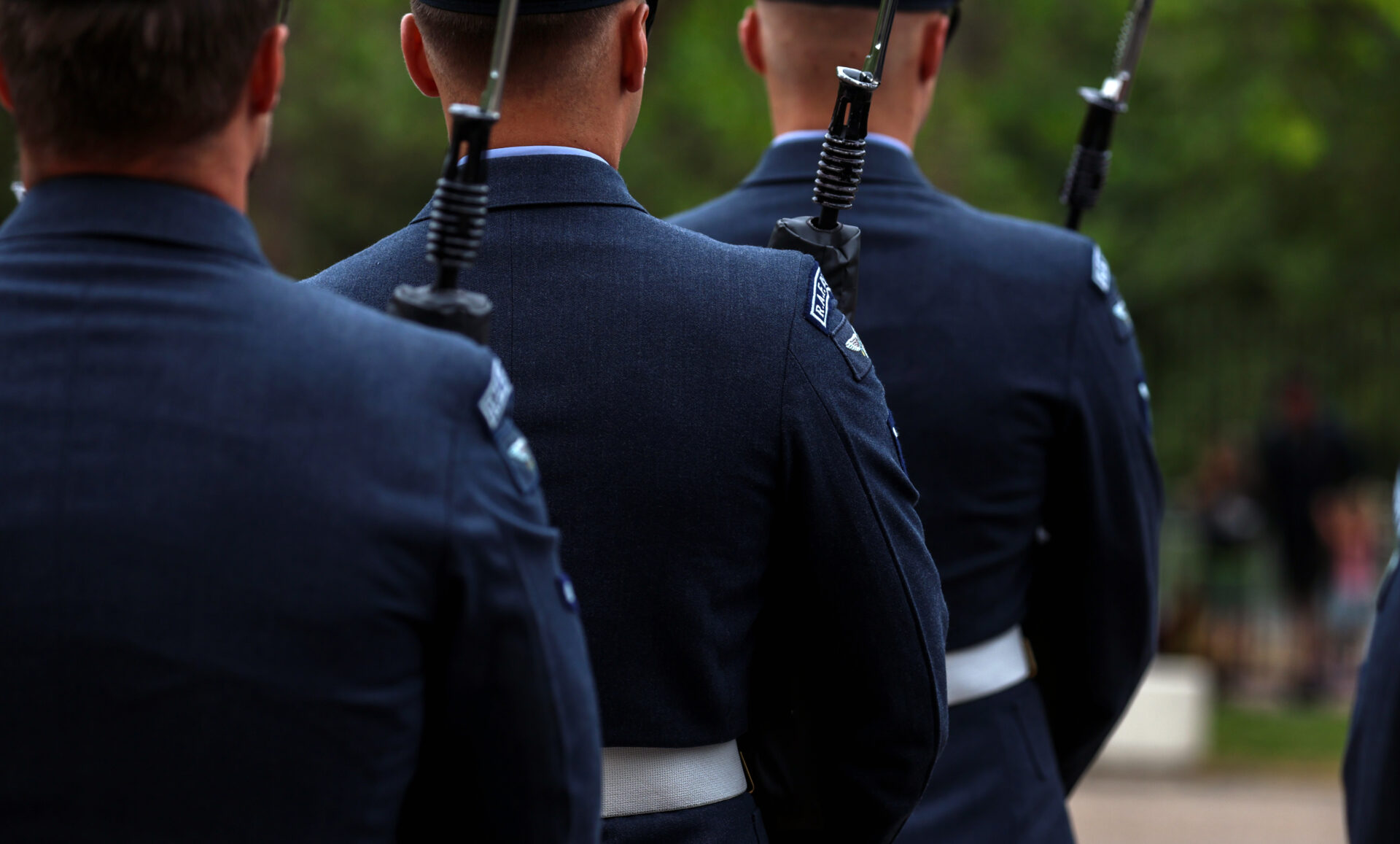The recently reported move by the RAF to manage supply of vegan alternative uniforms on request, whilst not necessarily quite as new as it may seem, may initially appear to challenge military identity, organisational culture, and the nature and Operational Effectiveness of a modern fighting force.
But whilst I’m not vegan myself and therefore won’t be taking advantage of this policy, I believe that it’s a sensible and entirely appropriate step forward, that strengthens the RAF by demonstrating its commitment to its people, broadening its appeal to potential recruits, and reinforcing its ethical foundations without compromising Operational Effectiveness.
There’s been a lot of hate and derision over this, on social media, in various media outlets, and sadly even in the Service itself – unfortunate but unsurprising in the current climate. But I’ve also received and seen some genuine and reasonable comments – some from people I greatly respect – that I think do deserve and warrant a considered response. I’m entirely uninterested in feeding trolls, but I do believe in giving and receiving reasonable challenge and engaging in respectful debate – this is my attempt to contribute to that conversation.
Individualism vs Uniformity
The core purpose of a uniform is to foster a collective identity and spirit, subordinating the individual to the team. The criticism is that allowing ethical variations undermines this principle.
However, I’d suggest this is a misinterpretation of the meaning, intent, and value of uniformity. Uniformity is not conformity, and Unit cohesion is not threatened by diversity; indeed, combined with psychological safety and strong, effective leadership (as one would expect in a military environment), diversity enhances military organisational effectiveness. Uniformity in the military is therefore about common standards and unity of purpose, not the literal, molecular composition of every item. A Service person’s identity and function are defined by their rank slide, trade badge, and the uniform’s cut, feel, and colour, none of which are altered by using appropriate non-animal materials.
The military has a long history of accommodating deeply held beliefs without sacrificing cohesion. We accommodate religious dietary needs in rations, allow turbans and hijabs that conform to regulations, and respect religious holidays. Providing a vegan uniform option is simply a modern extension of this principle to include deeply held ethical convictions. True cohesion comes from shared values like courage, respect, and integrity, not from enforcing conformity down to the last stitch.
A force that respects and values the conscience and cognitive diversity of its people strengthens the moral component, and is thus more unified and resilient.
I’d also note that as long as I’ve been serving, personnel have always been able to source different boots and other items, to optimise their comfort. Go to any military Unit, and you’ll see personnel in Altberg, Aku, Kestrel, Lowa, Meindl, and many other brands of boot – all procured through the stores issue system, and all intended to ensure individual comfort and suitability. There’s very simply nothing new or controversial about accommodating individual needs to enhance performance.
Cost and Resources
It’s argued that this is an unnecessary expense, diverting funds from more critical areas, like frontline equipment or improving pay.
But the Strategic Defence Review 2025 recognises that representation, empowerment, and flexibility for our people is an investment. The cost of recruiting and training a Service person is significant – tens of thousands for a recruit and millions for a pilot. Losing even a small number of highly skilled personnel, or indeed deterring potential recruits, because of an easily solvable conflict with their (non-Operational) beliefs, costs far more to Defence than the marginal expense of sourcing alternative boots or gloves.
The policy is “on request”, and with MoD Vegan & Vegetarian Network membership, currently around 320 (including Civil Servants) and around 100 personnel registered as ethical vegans on JPA, there’s nothing to suggest this will be anything more than a small-scale, very manageable requirement, not a wholesale replacement of all stock. As with any new item, initial costs may be higher, but they will decrease as supply chains mature. Put simply, this is an intelligent strategic investment in talent retention and recruitment, and performance optimisation.
Supply Chains and Logistics
A common concern is the added complexity to an already stretched logistics system, especially when deployed on Operations.
But while this does add a layer of complexity, it is a very solvable problem for a 21st Century military force. Defence logistics already manage a vast and complex catalogue of specialist equipment, providing flexibility different climates, roles, platforms, and indeed individual needs. Adding one more type of boot to the inventory system is a manageable logistical challenge of a logistics chain built on flexibility as a core principle, not an insurmountable barrier.
Again, I’ve both seen and personally benefited from access to a variety of boots through the system, including in some very remote locations. And the alternative – telling a Service person they cannot serve or must violate their conscience because of an easily manageable supply issue (that we already manage perfectly well) – is simply incongruent with a ‘people-first’ approach.
Warfighting Ethos
Frankly, I’m in two minds about even entertaining this one, but it is one of the most commonly cited concerns: that such policies are ‘woke’ or ‘soft,’ detracting from the military’s core focus on lethality and Operational readiness.
It won’t surprise any who know me at all to know that for me, the supposed tension between being an inclusive, compassionate employer, and being a formidable, effective fighting force, is absolutely a false dichotomy.
Warfighting capability is delivered by people. A person’s effectiveness is determined by their training, skill, and commitment, not the material their boots are made from – a long as it meets standards. An ethical
vegan pilot is no less capable of flying a Typhoon, and a vegan engineer is no less skilled at maintaining it.
Furthermore, a strong warfighting ethos is built on a foundation of moral and mental resilience. Forcing personnel to violate their core ethical beliefs can be a source of significant internal conflict and distress, potentially contributing to moral injury. By respecting these beliefs, the RAF strengthens the moral component of its fighting power. A Service that cares for the well-being of its people creates more committed, focused, and resilient warfighters, and thereby doesn’t detract from, but rather optimises its Operational Effectiveness.
Uniform Fit for All
A powerful argument is that this is a niche issue diverting attention and resources from the long-standing and critical failure to provide properly fitting uniforms and equipment for all body shapes, particularly women.
It Is absolutely correct that the provision of properly fitting equipment for all personnel, especially body armour and clothing for women, is a foundational and non-negotiable priority. It is a matter of both safety and principle.
However, these two issues are not mutually exclusive; this is not an ‘either / or’ situation. An organisation as large and capable as the Ministry of Defence can and must (and absolutely does) pursue multiple lines of effort simultaneously. Acknowledging and solving the vegan uniform issue does not inherently detract from solving the female (and other) fit issue.
In fact, I’d suggest that success in this small area enhances the wider case. It demonstrates that the organisation is alive to the needs of its diverse workforce and is capable of adapting its processes to be inclusive by design. Such progress in one area creates precedent, builds momentum, and clears a path for others. The goal is to foster a culture where all legitimate equipment needs are identified and met. This policy is a step towards that culture, not away from it. Both goals are part of the same overarching effort: to ensure every single person has the kit they need to do their job safely and effectively.
Summary
I get the concerns, but to my mind, this policy is a very welcome forward step that:
- Engages and supports our people;
- makes minimal or no difference to a Defence logistics ecosystem that has always offered flexibility with pragmatism and professionalism;
- contributes to building a culture that is inclusive by design;
- aids recruitment, engagement, and retention; and helps to optimise Operational Effectiveness.
Frankly, the question is not ‘Why are we doing this?’, but ‘Why wouldn’t we?’

Manish
A member of the Wavell Room editorial team, Manish is a GP, Royal Navy Medical Officer, and ethicist with almost 3 decades of experience leading people-focused initiatives, both within and outside Defence. He also advises healthcare, education, policing, and community institutions on ethics, people strategy, and organisational culture change. He wrote his PGDip dissertation on military humanitarianism, and his doctoral thesis on Defence diversity networks.




